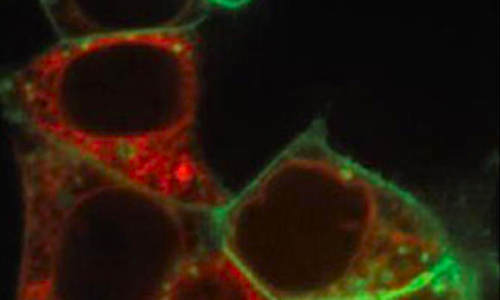Pathogens entering our body only remain unnoticed for a short period. Within minutes our immune cells detect the invader and trigger an immune response. However, some viruses have developed strategies to avoid detection and elimination by our immune system. Researchers from the Helmholtz Centre for Infection Research (HZI) in Braunschweig have now been able to show how the herpesviruses achieve this.
Photo Credits: Helmholtz Centre for Infection Research
The Kaposi’s sarcoma-associated herpesvirus (KSHV), a gammaherpesvirus that can cause multiple forms of cancer, establishes lifelong infections within the body. To do so the virus has to find a way to modulate the immune system of its host.
„Intruders are usually fought off immediately by an antiviral immune response that is triggered by sensors including the toll-like receptors (TLR),” says HZI researcher Dr. Kendra Bussey, author of the study that was published in the “Journal of Virology”. Toll-like receptors detect the virus by binding to structures on the viral surface or the viral DNA, and trigger a signal chain that in the end leads to an antiviral immune response. Ideally this means that the pathogen is eliminated immediately. This mechanism, however, does not seem to work for KSHV and other gammaherpesviruses, as those can remain within the body for a long time.
How the virus does this was unknown until now. The scientists from the HZI research group “Viral Immune Modulation” under the leadership of Prof. Melanie Brinkmann have now been able to show that the virus is actively preventing activation of the innate immune system through Toll-like receptors.
It has yet to be established how exactly and in which part of the Toll-like receptor function is disturbed. This is one of the leverage points for future research: “The better we understand how the virus protects itself from attacks by the immune system, the better we can use this knowledge to fight infections,” Brinkmann says.
This may lead to the development of new drugs against gammaherpesviruses. “Those agents could actively protect the immune system and prevent viruses from winning the fight against it,” says Bussey. “However, this is still a long way off.”
Story Source:
The above story is based on materials provided by Helmholtz Centre for Infection Research.





